Drop a pebble in the water — just a splash and it’s gone,
But there’s half a hundred ripples circling on and on and on,
Spreading, spreading from the center, flowing on out to the sea,
And there’s just no way of telling where the end is going to be.
Dear Jonah,
At the turn of the 20th century, James W. Foley, the Poet Laureate of North Dakota (!), must have thrown his share of pebbles into water as he thought about the impact even the tiniest participants in Creation can have on the world.
I, of course, contemplate this all the time. Whenever I think about your 19 years, I want to know that your short life meant something, and that it made a difference to have you among us.
 Recently, I discovered a ripple of yours that has continued reverberating through the universe even eight years after your death. What’s magnificent about this particular ripple is that it only reached me a few weeks ago.
Recently, I discovered a ripple of yours that has continued reverberating through the universe even eight years after your death. What’s magnificent about this particular ripple is that it only reached me a few weeks ago.
These events started more than ten years ago. Who knows how much of the story we got right, but there are enough people who have told me it seems to have happened this way that I feel comfortable setting it down for posterity — because if you didn’t do this, Jonah, you were certainly capable of it!
As one of my favorite Hasidic stories concludes, “They don’t tell stories like this about you or me.”
The lion’s share of this narrative must be credited to Chana Rothman, a talented musician and incredibly kind human being who taught you (at URJ Kutz Camp during the summer of 2005) how to be a songleader. Chana had already been pondering these events for many years now and, when I asked her what she knew about them, she jumped at the opportunity to piece it all together with me.
Our story begins in the summer of 1999. Dan Nichols had been on a whirlwind tour of Jewish summer camps that were just getting to know this giant of new Jewish music. He’d been on the road from May through August and while he was glad to be doing so, he missed his wife a lot. Sitting in his room at Kutz Camp, the most recent leg of his journey, Dan was thumbing through a prayerbook and the nighttime prayer, Hashkivenu, caught his eye. Then and there, he composed the music that so many of us have come to love.
Fast forward to the summer of 2005. You were at Kutz and a participant in Jen Gubitz’s and Chana Rothman’s songleading major. While you demonstrated quite an aptitude (not to mention, pretty good singing and guitar-playing skills) to be able to songlead in front of your community, you ultimately chose not to. As always, you would find your own path to leadership (and, reluctantly or not, to fame).
Chana put it this way:
As we all know, Jonah was a bit of a smart ass, especially in large groups. He was like, “I’m going to lead my own way. It might go slightly against the grain, but I’m going to poke you just a little bit.”
I knew this side of you quite well, Jonah. As your dad, your antics at home were sometimes disruptive but it was hard to grow angry because you never seemed to be doing it for selfish reasons. You just liked to help people smile. And I didn’t exactly hope you’d grow out of it. I was hoping you’d tame it and become adept at judging best moments for asserting your pop-up anarchy, but I loved that it was such an essential part of you.
Since at times I also had to be your rabbi, I was fascinated (and really only sometimes annoyed) as you gently rebelled against temple customs and bureaucracies without bothering your dad-the-rabbi too much. That, I suppose, is why, during your Confirmation service, you vividly (and gleefully) described to the congregation a scene where I had been on the roof of the temple, entwined in a light saber battle with Adolf Hitler. That’s my boy.
Chana set the scene for the pebble you would drop:
Dan had come to Kutz that summer and left me with his latest CD, “My Heart Is in the East.” That’s when I first heard Hashkivenu. I listened to it and cried, and thought, “This is gorgeous. We have to teach this.” I introduced it that summer at Kutz, but it was later that year, at NFTY-NAR regional retreats, that it caught on.
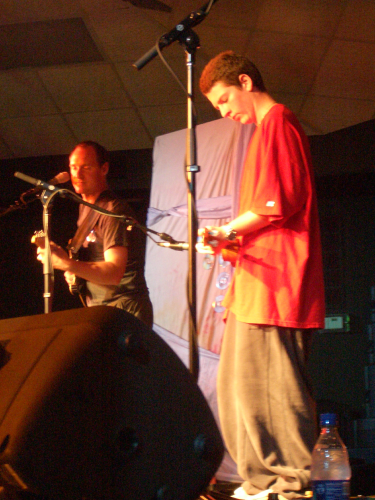
Dan & Jonah @ Kutz (Jul ’05)
Dan’s 2005 visit to Kutz had made a powerful impression on you too. Two months earlier, you’d purchased an ukulele and Dan asked you to join him onstage during his concert for one song, “Turn the World Around.” Because of its intricate rhythms, it wasn’t an easy song to play, so your mom and I (who were fortunate to be present at that concert too) were flipping out at how wonderful a performer your 15-year-old self was becoming. [Note to others reading this: If you’d like to know more about Jonah’s performance with Dan, read Reflections on Jonah as Musician – Part Four.]
The pebble drops:
I led Dan’s Hashkivenu with a driving strum, which was different from the gentle pick Dan used in his recording. At the end of the song, I would repeat the chorus one more time but with these strong guitar strums only on the downbeats and no other strums in between. It was almost but not quite a capella.
And then it happened. During the NFTY-NAR event at Eisner Camp, maybe the winter kallah (December 2005), I was playing Hashkivenu. We reached the repeated chorus at the end and Jonah went, “Dut dut dut dut tchhhhh.” I thought, “What? What?!”
Jonah had added the missing rhythm, as if to say, “Hey! What about that driving beat that you were strumming before? I’m putting it back in!” And being Jonah, he was very intentional about it — he only added the drum beat at the end of the song when the guitar was no longer providing it.
Okay. Adding a few sound effects to a song is not a major contribution to human civilization. But it’s not nothing. Especially when you see how pervasive it’s become. Do I wish you’d lived long enough to do something truly important? Of course I do. Mostly I wish you’d just lived.
Very few of us get to contribute something BIG during our lifetimes. But that doesn’t mean what we do isn’t important. Primarily, I think, if we just love the people around us, take the time to see that they’re okay, and maybe give them something to smile about, then we’ve done a pretty good job. And at that, Jonah, you were masterful.
But these silly sound effects, which aren’t of much consequence really, came from you. And to learn about it all these years later, that’s consequential for me.
Then came the ripples:
I don’t remember how it became not just Jonah doing it, but eventually it became a thing. Lots of things that Jonah did became things that others did because he was so freaking appealing. He had this chutzpadik thing where he was like, “I’m doing this and it’s just a little different than what you’re doing.” And I was like, “Okay.”
Then slowly it became a thing that NFTY-NAR did when we played Hashkivenu. I felt this back-and-forth between me, my guitar, and a group of cheeky teenagers. It was great and funny and totally Jonah, and totally Jonah’s cohort.
Years later, I started hearing it everywhere. At a BBYO event, and at Camp Coleman just a week ago. This is ten years later and your drumming has shown up in Cleveland, Georgia!
JoJo, when I first heard of your involvement in this, I couldn’t smile enough. It’s such a great story and such a huge surprise for me. I thought I knew every story there was to tell about you. I’ve done so much to try to find these stories and here we are, eight years later, and all of a sudden someone says, “Oh, yes, he made this thing.” At first, I thought, “Oh, come on. He didn’t.” Then came the corroboration from too many people that I respect too much to be able to dismiss it.
It’s not a big thing but it feels like a big thing. It’s cool and it’s indicative of the impact that you had, of the impact than anybody can have. While this wasn’t big, it’s evidence of how throwing a small pebble into a pond can create a whole lot of ripples.
Chana disagreed:
It is a big thing. Because each small moment can be so important to the people who experience it. And somewhere down the road, it can become important to people who are also experiencing it but don’t necessarily know where it came from.
She was right, of course. For me, I think of all the times that I’ve led services at Woodlands with NFTY kids in the room and we sing Hashkiveinu. They do “that thing” and I think, “Oh, come on, guys. It’s not appropriate in here.” But I can never seem to say that out loud, so I just sigh and let them do it, having no idea that it was my own son who had instigated this!
Dan told me that whenever he’s playing Hashkivenu and his audience adds the “Dut dut dut dut tchhhhh,” he says to himself, “There’s Jonah!” You can bet I’ll be thinking the very same thing. For the rest of my life, your slightly-irreverent-but-ultimately-musical comment will, for me, be a shout-out saying, as you always loved doing, “Pokey pokey, Dad,” just to let me know you might be out of sight but you’ll never be out of mind.
In the end, Jonah, whether you were creator or perhaps lead enthusiast, you’ve given me a new story. I’d thought that was impossible, and I’d stopped waiting for them. How sweet to crack open one more window into your life, to be able to peek into it one more time, and to see something I’d not seen before.
My thanks to Barry Shainker, a Jewish educator who wrote me from Kutz this summer to ask if it’d be okay to tell this story there. To Barry, I wrote (after expressing surprise and delight at your connection to all of this), “Thank you. It’s a real gift to bring my son to me out of the blue.”
Barry told me that during the summer after your death, the Kutz Camp community kept this tradition alive as a way to honor your memory. Like so much of this story, I don’t know where the truth resides but even to suggest that people are doing things so that they can remember you, well, that’s just about the sweetest thing someone could do or say.
Toward the end of his poem, the Poet Laureate of North Dakota writes:
Drop a word of cheer and kindness — just a flash and it is gone,
But there’s half a hundred ripples circling on and on and on
Bearing hope and joy and comfort on each splashing, dashing wave ‘
Til you wouldn’t believe the volume of the one kind word you gave.
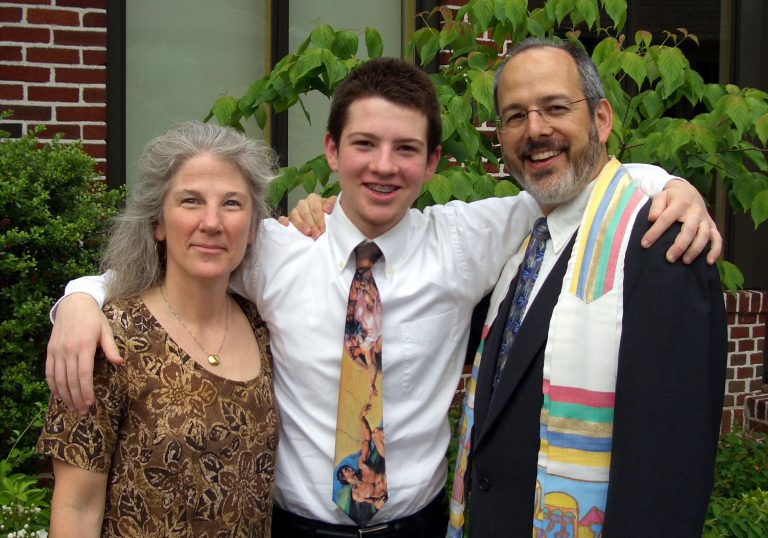
Confirmation (Jun 06)
The music you brought into this world did indeed affect a lot of people. You loved sharing it any way that you could. Those who have listened to you, sung with you, learned how to play guitar with you, experienced just a few of the ways that your life continues to ripple outward.
But it was your pervasive goodness – your gentle, caring, giant heart – that made your greatest impression on us. Those ripples were huge. And important. Truly important. Your humanity was the BIG thing that you did while you lived among us. It was what so many of us loved, and cherished, and will never forget about you.
You taught us such a basic, vital lesson: Be good to each other.
May its ripples never end.
Love you forever,
Dad
Foley, James W. “Dropping Pebbles in the Stream.” The Verses of James W. Foley (Volume II, Book of Plains and Prairie). Bismarck, North Dakota: R. D. Hoskins, Publisher, 1911. Page 17. Print.
“Hashkiveinu” (Dan Nichols) used by permission.

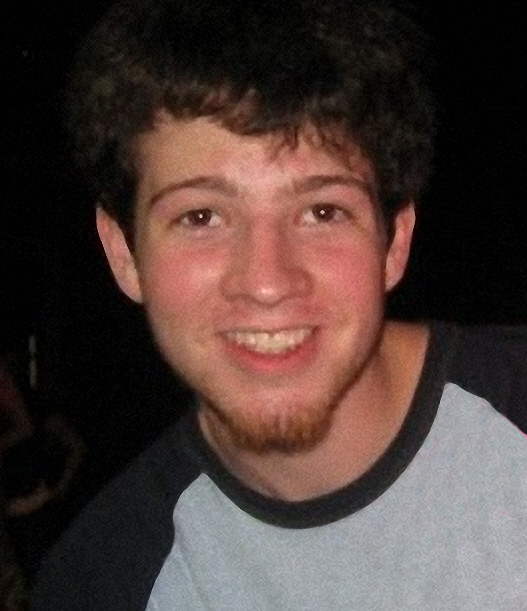
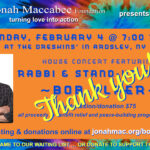
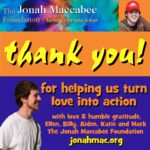
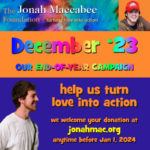
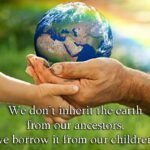

1 comment
Join the conversationLora Heller Baby Fingers - August 29, 2017
Beautiful post.
Our whole family has such warm memories of Jonah at Kutz, with and without music.
xoxo